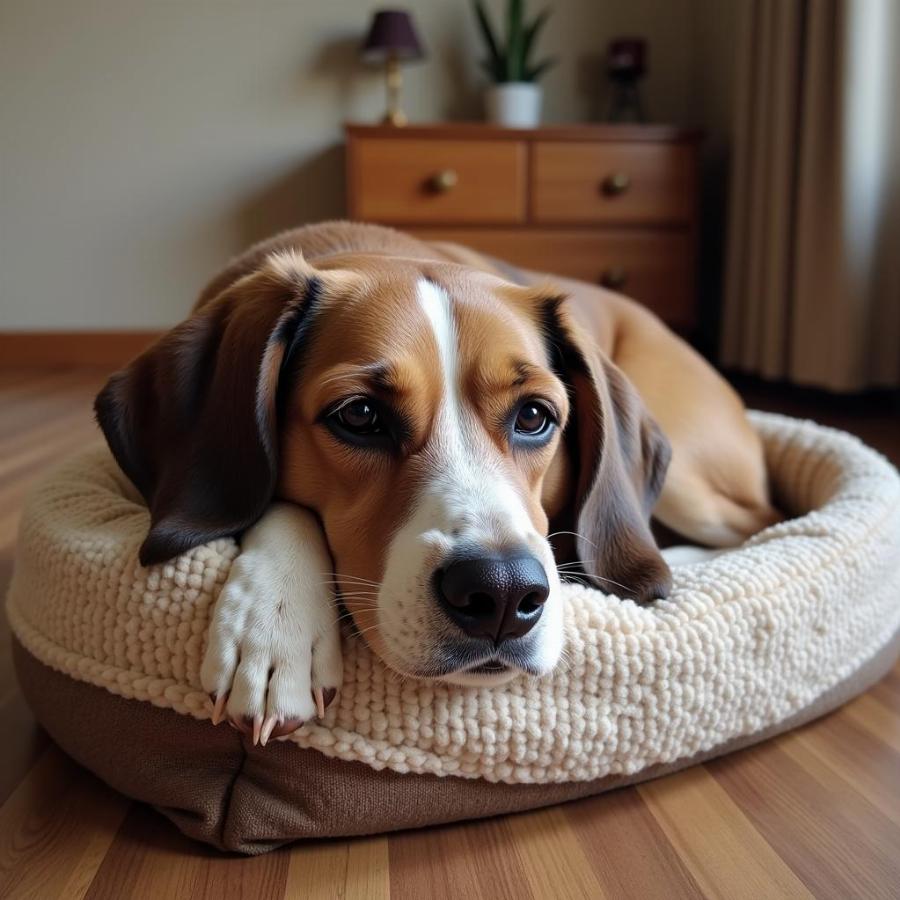As our furry friends enter their golden years, we might notice changes in their behavior, including their breathing. Senior dog panting can be completely normal, especially after exercise or when it’s warm. However, excessive panting or panting that seems out of context can sometimes signal an underlying health issue. Let’s explore the common reasons behind senior dog panting and when it’s crucial to seek veterinary attention.
Normal Panting vs. Cause for Concern
Dogs pant to regulate their body temperature. It’s a natural cooling mechanism that helps them evaporate moisture from their tongue and lungs. It’s perfectly normal for your senior dog to pant after a playful romp in the park or on a sunny day.
However, if your senior dog is panting excessively, even when at rest in a cool environment, it’s essential to pay attention. This could indicate a problem that requires veterinary attention.
Here’s a closer look at the potential causes of excessive panting in senior dogs:
Medical Reasons for Senior Dog Panting
1. Pain and Discomfort
Just like us, dogs can experience pain as they age. Arthritis, dental disease, and cancer are just a few conditions that can cause discomfort and lead to increased panting. If your senior dog seems stiff, has difficulty moving, or shows signs of oral pain, it’s essential to schedule a check-up with your veterinarian.
2. Heart Problems
As dogs age, their hearts can become less efficient. Heart disease can manifest in various ways, and panting is a common symptom. If your senior dog’s panting is accompanied by coughing, lethargy, or a bluish tint to their gums, seek immediate veterinary care.
3. Respiratory Issues
Respiratory conditions like pneumonia, kennel cough, and even allergies can cause senior dogs to pant more. Pay attention to any wheezing, coughing, or nasal discharge, as these can signal a respiratory problem.
“Senior dogs often have underlying health conditions that can cause increased panting,” says Dr. Emily Carter, a veterinarian specializing in geriatric canine care. “Early detection is key to managing these conditions and ensuring your furry friend enjoys their golden years comfortably.”
4. Cushing’s Disease
Cushing’s disease, a hormonal disorder that causes the adrenal glands to overproduce cortisol, is more common in senior dogs. Increased thirst, urination, and panting are classic signs of this condition.
5. Anxiety and Stress
Our senior dogs can experience anxiety and stress, just like we can. Loud noises, changes in routine, or separation anxiety can all trigger panting. If you suspect anxiety is the culprit, talk to your vet about ways to create a calm and reassuring environment for your furry friend.
 Senior Dog Resting in a Cozy Bed
Senior Dog Resting in a Cozy Bed
What to Do If Your Senior Dog is Panting Excessively
If your senior dog is panting more than usual, don’t ignore it. Schedule an appointment with your veterinarian. They can assess your dog’s overall health, perform any necessary tests, and determine the underlying cause of the panting.
Tips for Keeping Your Senior Dog Comfortable
- Provide a cool and comfortable resting area.
- Ensure your senior dog has access to fresh water at all times.
- Avoid strenuous exercise, especially during the hottest parts of the day.
- Consider using a harness instead of a collar to avoid pressure on your dog’s neck.
- Provide mental enrichment to prevent boredom and anxiety.
Beaut Dogs: Your Partner in Senior Dog Care
Beaut Dogs is your go-to resource for all things related to senior dog care. We understand the unique needs of aging dogs and provide expert advice, tips, and product recommendations to help you keep your furry friend happy and healthy. For any assistance, please reach out to us at [email protected].
FAQs About Senior Dog Panting
Q: Is it normal for my senior dog to pant while sleeping?
A: It depends. Light panting during sleep can be normal, but heavy panting or gasping for air is not. If you notice any unusual breathing patterns while your dog sleeps, consult your veterinarian.
Q: Can medications cause panting in senior dogs?
A: Yes, some medications can have panting as a side effect. If your dog started panting after starting a new medication, let your veterinarian know.
Q: Should I be concerned if my senior dog pants after drinking water?
A: A few pants after drinking water are usually fine, but if the panting is excessive or prolonged, it could be a sign of a problem.
Learn More About Your Senior Dog’s Health
Remember, paying close attention to your senior dog’s behavior and seeking prompt veterinary care when needed can help ensure they enjoy a happy and comfortable life well into their golden years.